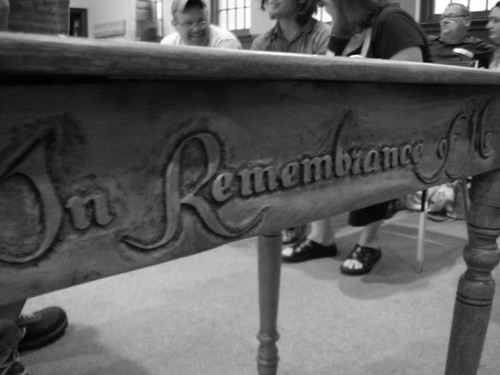
I have to admit, when Joline is gone, I watch things that I normally don't get the chance to . .say . . Planet of the Apes. . thus the late entry.
Galli's book has been a refreshing read in light of my previous posts. Refreshing because it was a book about Jesus, and because it challenged my thoughts and confirmed by inclinations about the person of Jesus. I use the word person because we are always talking about the humanity and Deity of Jesus, but what of the person of Jesus?
This is where Galli takes us, to the person of Jesus, who is fully God and fully human. In both his humanity and deity Jesus demonstrates being untamable and fully loving in the most frustrating of ways. Galli pushes at our idolatry, re-creating Jesus in our own image . .well not our image. . the image we desire. In the same way Bonhoeffer challenged our desire for cheap grace, Galli challenges our desire for a nice God, not a loving God, for a loving God is willing to discipline, yeah even shame if necessary.
It was Galli's chapter titled 'Harsh Tutors of Love' that challenged me the most in its discussion of Jesus using shame and fear as ways to lovingly confront our sin. While I liked this chapter, I am still wrestling with it, but isn't that what a good book does, challenge us?
This book does not set out to make Jesus more masculine, but it does set out to ask the question "How does Jesus Love us?", and we find out that Jesus doesn't quite love us in the same way Mr. Rogers does. Sure, he might like us just the way we are, but he isn't concerned about us staying the same. He demands that we be different. He place the responsibility on the reader to love as Christ loved, but takes the responsibility of the response away from us ( knowing we can create enemies if we love like Jesus).
There are so many books I wish our whole congregation could read, and this would be one of them. Galli doesn't spend a lot of time mixing words. He gets to the point and moves on. His chapters are well thought out, and concise. His writing is conversational. I found it easy to read, but not remedial.
It would be a good book for a small group to use as a resource, but only after the group has been together for a while.
If you are bored with your faith and think you know the Jesus of the Bible, this would be a good book to get your interest in the person of Jesus refueled.
Friday, April 4, 2008
Book Review # 9: Jesus Mean and Wild by Mark Galli
Posted by George Atkins at 9:59 PM
Subscribe to:
Post Comments (Atom)

2 comments:
So, I'm sincerely hoping it was the wonderful, madhousy, 1960s Planet of the Apes, and not the one where Tim Burton hit his head really hard and decided to take a break from being a good director to make a movie with monkeys in it.
On other (less serious) subjects, how does Galli connect shame and love? What does love mean and how does it manifest? Do you think we need to see different sides of Christ's love in different circumstances? If so, who is Galli's audience?
Jon,
It was with Charlie Heston .. how befitting, and who would have guessed he would pass away the next day. There are so many great lines from that movie. It would be a fascinating moving to use in discussing apologetics. Dr. Zaius is an intriging character for me because he represents the best and worst of instituionalism. Dare I go on. . . .
Being more serious, Galli proposes that Christ is willing to shame us with the intent of changing our thinking and thus changing our actions. While his initial reaction may not seem loving, the end result is righteousness ( ends justify the means). Galli proposes that Jesus was not concerned with the feelings of the Pharisees, but was interested in helping them understand the Kingdom of God, thus he would say and do things that would publiclly shame them in a culture that is largely based on shame and honor. Thus their desire to kill him.
Even after healing a person, Christ sternly warns them to tell no one and then sends him away.
Galli uses the gospel of Mark as his platform, in which the language is very quick and confrontational. To quote a quote from his book, Marilyn Chandler McEntyre says the gospels are telling us (disgruntled children) " This is what love looks like."
So, what does love mean? It means more than being nice. Its the opposite of avoiding confrontation. Its not tolerant. The kind of love Galli proposes is a love that embraces brokeness and moves toward redemption. Its the kind of love that will sacrifice immediate gratification or comfort for long term change and reconcilliation.
Galli's audience is the church, but also I think all of those who think they know who Jesus is. He challenges those who have a "Jesus is my buddy" attitude, and those (like the pharisees) who think they have figured out the Jesus-formula (fundamentalists). Galli promotes a strong curiosity about the person of Jesus.
I think you would enjoy it.
Post a Comment